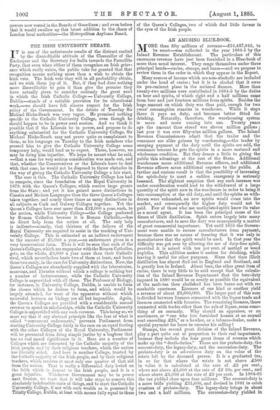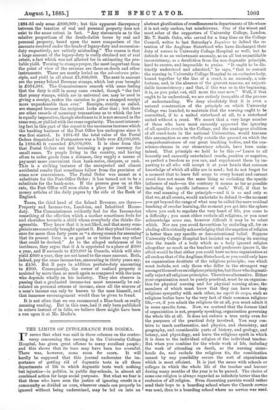AN AMUSING BLUE-BOOK.
MORE than fifty millions of revenue—£54,437,945, to be exact—was collected in the year 1884-5 by the Inland Revenue Establishment. The particulars of this enormous revenue have just been furnished in a Blue-book of more than usual interest. They range themselves under three principal heads—excise, stamps, and taxes—and we propose to review them in the order in which they appear in the Report.
Many sources of income which are non-alcoholic are included under the head of excise ; but it is to alcohol that it owes its pre-eminent place in the national finance. More than twenty-two millions were contributed in 1884-5 by the duties on beer and spirits, of which eight and a half millions came from beer and just fourteen millions from spirits. Besides the huge amount on which duty was thus paid, enough for two years' consumption remains in warehouse. While it stays there it pays no duty, and becomes better fitted for drinking. Naturally, therefore, the warehousing system is more and more coming into use. Twenty years ago the amount thus stored was eleven million gallons ; last year it was over fifty-nine million gallons. The Inland Revenue Commissioners admit that the trader and the consumer are alike gainers by warehousing,—the trader by escaping payment of the duty until the spirits are sold, the consumer because he gets the spirits in a more matured and wholesome condition. But they demur a little to giving the public this advantage at the cost of the State. Additional warehouses mean additional Revenue officers, and additional Revenue officers mean additional expense to the public. A further and curious result is that the possibility of increasing the spirit-duty to meet a sudden emergency is seriously lessened. The slightest suspicion that any such increase was under consideration would lead to the withdrawal of a large quantity of the spirit now in the warehouse in order to bring it into consumption at the old duty, and until the spirits so with- drawn were exhausted, no new spirits would come into the market, and consequently the higher duty would not be paid. Few of those who use methylated spirit know its value as a moral agent. It has been the principal cause of the disuse of illicit distillation. Spirit enters largely into many manufactures, and to save the duty was consequently a matter of great commercial importance. Yet until 1855 the Govern- ment were unable to excuse manufacturers from payment, because there was no means of insuring that it was only in manufactures that the spirit would be used. In that year the difficulty was got over by allowing the use of duty-free spirit, provided it is mixed with ten per cent, of methyl or wood naphtha. This addition makes it useless for drinking, while leaving it useful for other purposes. Since that time illicit distillation has almost died out in England and Scotland, and is greatly less in Ireland. About beer, the other great item of excise, there is very little to be said except that the calcula- tion of the Inland Revenue Department that the beer-duty imposed in 1880 would be as nearly as possible the equivalent of the malt-tax then abolished has been borne out with re- markable exactness. Licences of one kind or another yield a revenue of about £3,600,000. The larger part of this sum is divided between licences connected with the liquor trade and licences connected with luxuries. The remaining licences, those connected with trades other than the sale of liquor, seem some- thing of an anomaly. Why should an appraiser, or an auctioneer, or "one who lets furnished houses at an annual rent exceeding £25," or a hawker, or a tobacco-dealer, make a special payment for leave to exercise his calling?
Stamps, the second great division of the Inland Revenue, play a part quite out of proportion to their real importance, because they include the four great items of revenue which make up the "death-duties." These are the probate-duty, the account-duty, the legacy-duty, and the succession-duty. The probate-duty is an ad-valorem duty on the value of the estate left by the deceased person. It is a graduated tax, in so far that where the estate is not above £500 in value it is calculated at the rate of £2 per cent., where not above £1,000 at the rate of £2 10s. per cent., and where above £1,000 at the rate of £3 per cent. In 1884-85 the tax yielded close upon four millions. The account-duty is a mere trifle' yielding £31,000, and devised in 1881 to catch evasions of probate-duty. The legacy-duty brings in about two and a• half millions. The succession-duty yielded in 1884-85 only some £800,000; but this apparent discrepancy between the taxation of real and personal property does not exist to the same extent in fact. "Any statements as to the relative proportions of the death-duties borne by real and personal property, based upon the mere comparison of the amounts received under the heads of legacy-duty and succession- duty respectively, are entirely misleading." The reason is that a large amount of the legacy-duty is really obtained out of real estate, a fact which was not allowed for in estimating the pro- bable yield. Turning to stamps proper, the most important from the point of view of the revenue are those on deeds and other instruments. These are mostly levied on the ad-valorem prin- ciple, and yield in all about £1,800,000. The next in amount are the penny Inland Revenue stamps, which last year brought in £934,381. The Commissioners remark with some feeling that the duty is still in many cases evaded, though "the fact that penny stamps, which are in universal use, may be used in giving a receipt, makes the omission to give a stamped receipt more unpardonable than ever." Receipts, strictly, so called, are stamped because the recipient looks after that ; but there are other records of monetary transactions as to which the law is equally imperative, though obedience to it is not secured in the same way, or yielded with the same regularity. The most interest- ing fact in this part of the report is the enormous increase which the banking business of the Post Office has undergone since it was first started. In 1881-82 the total value of the Postal Orders despatched to Postmasters was a little over £2,000,000. In 1884-85 it exceeded £8,600,000. It is clear from this that Postal Orders are fast becoming a paper currency for small sums. To people living in the country, and having often to order goods from a distance, they supply a means of payment more convenient than bank-notes, cheques or cash. This is a striking instance of the unexpected and almost accidental results that sometimes follow from the provision of some new convenience. The Postal Order was meant as a substitute for the Post-Office Order ; it has turned out to be a substitute for the bank-note. If the process goes on at this rate, the Post Office will soon claim a place for itself in the money articles of the daily papers by the side of the Bank of England.
Taxes, the third head of the Inland Revenue, are three— Property and Income-tax, Land-tax, and Inhabited House- duty. The Commissioners evidently feel for the Income-tax something of the affection which a mother sometimes feels for and cherishes towards a child whom everybody else thinks dis- agreeable. They know that it is not liked, and that many com- plaints are constantly brought against it. But they plead its exist- ence for more than forty years as "a strong reason for assuming that its present form is as good as or better than any other that could be devised." As to the alleged unfairness of its incidence, they argue that if A is appointed to a place of £600 a year, and B succeeds to £20,000 in Consols, which will also yield £600 a year, they are not taxed to the same amount. Both, indeed, pay the same income-tax, amounting in thirty years say, to £450. But B pays in addition probate-duty amounting to £600. Consequently, the owner of realised property is mulcted by more than as much again as compared with the man who depends wholly on his industry. They also observe in passing that a graduated income-tax must necessarily be cal- culated on personal returns of income, since all the sources of a man's income can only be known to the man himself, and that immense encouragement would thus be given to fraud.
It is not often that we can recommend a Blue-book as really amusing reading. But in this case, had it only been published in octavo instead of in folio, we believe there might have been a ran upon it at Mr. Mudie's.



































 Previous page
Previous page